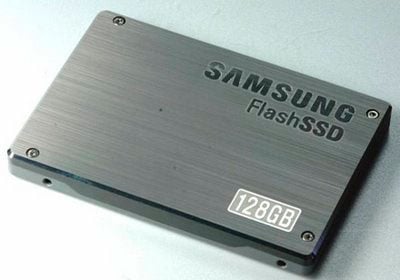Samsung Ramps Up Production on 128GB SSDs
If there is any doubt that Solid State Drives (SSDs) are the next medium for laptop storage, then don't tell the folks over at Samsung. They probably won't have time to take your call anyway, because they're busy ramping up production of Samsung's 128GB SSDs in both 1.8-inch and 2.5-inch form factors. This is in addition to the 64GB SSDs that Samsung ramped up production on only a few days earlier.
The Samsung SSDs use Multi-Level Cell (MLC) technology, which according to Wikipedia is:
"MLC NAND flash is a flash memory technology using multiple levels per cell to allow more bits to be stored as opposed to SLC NAND flash technologies, which uses a single level per cell. Currently, most MLC NAND stores four states per cell, so the four states yield two bits of information per cell. This reduces the amount of margin separating the states and results in the possibility of more errors.
MLC NAND has the benefit of being cheaper due to the denser storage method used, but software complexity can be increased to compensate for a larger bit error ratio (BER)."
In the press release, Samsung doesn't address how its SSDs deal with the increased potential for errors, but it does state that its MLC-based SSD's performance should be competitive with SLC-based SSD drives:
"The Samsung MLC-based SSD has a write speed of 70MB/s and a read speed of 90MB/s - performance levels that approach those of single-level-cell (SLC)-based SSDs now in mass production. Moreover, the new 128GB SSD will last approximately 20 times longer than the generally accepted 4-5 year life span of a notebook PC hard drive."
Samsung also sings the praises of SSD technology:
"Samsung SSDs feature far greater reliability, faster boot times and faster application start-up times than hard disk drives. Power consumption for the Samsung SSD is exceptionally low in standby mode at approximately 0.2 watts and in active mode at 0.5 watts."
There has been some debate as to whether flash-based memory is the ideal storage medium for a primary storage device, such as a system's hard drive. Despite Samsung's claims, flash memory can suffer from memory wear because by its very nature, flash memory cells can withstand only so many write cycles before they are prone to failure. While technologies exist to deal with this shortcoming of flash memory, the end result is potentially decreased storage capacity and slower writes times, as well as the increased possibility of write errors over time. As SSDs become more commonplace in laptops and desktops, real-world use will tell us if memory wear is really a significant issue or not.

There has also been some debate recently as to the true power-saving benefit of SSDs. Last month, Tom's Hardware ran a feature story titled "The SSD Power Consumption Hoax: Flash SSDs Don't Improve Your Notebook Battery Runtime -- they Reduce It." As the title suggests, Tom's Hardware found in its testing that "[laptop] battery runtimes actually decrease if you use a flash SSD." There has been some criticism, however, over Tom's Hardware testing methodology that casts at least some doubt on the veracity of the claim. The core issue of the criticism is that while the MobileMark benchmark is generally accepted to represent an appropriate real-world scenario for traditional hard-disk-based laptops, the benchmark might be measuring artificial performance when SSDs are used. For more on the debate, see the comments here.
Samsung also plans on ramping up production on 256GB SSDs before the year's end. It certainly seems that the SSD juggernaut is well under way and it will only be a matter of time before prices come down enough and storage capacities are high enough that SSDs will be poised to displace traditional platter-based hard drives. Let's just hope that by the time that happens that the potential memory wear and power-consumption issues get resolved.

